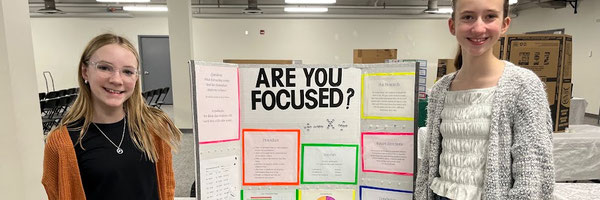Focus Factors: Investigating Student Concentration
Alexis Wilson Payton Greener
Grade 7
Presentation
Problem
We have noticed when we were in class that some kids would listen to music, some would want silence, and some would be in conversations. Everyone focuses differentley, and we wanted to know what majority of elementary students worked best with certain distractions. When we researched to see previous experiments, we saw that most experiments were tested on high school or college/university students. We wanted to find a solution to what most elementary students need to focus. We want to find out how all of these distractions affect student's brains.
Method
Our method started back in September. We both have always enjoyed listening to music while working. When we were brainstorming, we thought this would be a good idea. We knew how we worked on assignments with music, but we wanted to know how others brains work. We started off by getting four girls and four boys, randomly picked, from grades 3-6. We received grade appropriate math speed drills from their teachers. We took four student at a time, two girls, two boys, and sat them down in a quiet place at school. We had calm music, pop music, silence, an we took one to the hall and had a conversation while they worked. Everyone got the same time they would regularly get in class. Next, we tested the kids with the same tests four weeks in a row, o everyone tried out each distraction. After, we analyzed our information and made a chart. Next, we got the kids to fill out the forms, and received their birthdays, with their permission.
Research
We tested 32 students from grades 3-6. Everyone focuses differently, so we wanted to see how these students worked while doing quizes with different distractions. We researched a bit about this topic, to see if this has been done in the past. College/university students have been tested on with this expiriment, so we decided to try on elemetary
Data
Out of the thirty-two kids we tested, ten kids did best with calm music, seven kids with pop, eight with silence, andseven kids did best with being in a conversation. It was very close between all distractions, but all together most stuents did best with calm/classical music.
Conclusion
All together, ten of the thirty-two students we tested did best with calm/classical/spa music. Seven kids did best with pop/upbeat music, eight kids did best with silecne, and seven kids did best with being in a conversation/talking/answering questions. Our hypothesis stated that we (Alexis WIlson and Payton Greener) thought that calm/classical/spa music worked best with elementary students.
Citations
Acknowledgement
I thank my parents for sparking my interest in music and science, without them I would not be where I am right now. I thank Mrs.Gallant for helping me and really showing me how much fun science can be. I was never interested in science, but now I am, thanks to her. I want to thank my partner Payton Greener for doing this project with me. I want to also thank my piano teacher for getting me interested in music. I want to thank the judges at my school science fair for helping me get here.

